Items
Subject is exactly
Economy
-
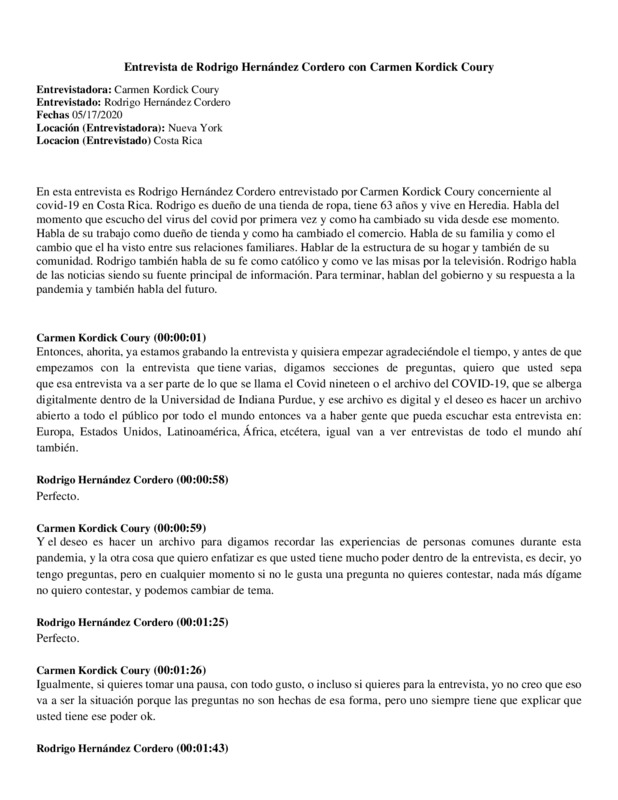 05/17/2020
05/17/2020Rodrigo Hernández Cordero Oral History, 2020/05/17
En esta entrevista es Rodrigo Hernández Cordero entrevistado por Carmen Kordick Coury concerniente al covid-19 en Costa Rica. Rodrigo es dueño de una tienda de ropa, tiene 63 años y vive en Heredia. Habla del momento que escucho del virus del covid por primera vez y como ha cambiado su vida desde ese momento. Habla de su trabajo como dueño de tienda y como ha cambiado el comercio. Habla de su familia y como el cambio que el ha visto entre sus relaciones familiares. Hablar de la estructura de su hogar y también de su comunidad. Rodrigo también habla de su fe como católico y como ve las misas por la televisión. Rodrigo habla de las noticias siendo su fuente principal de información. Para terminar, hablan del gobierno y su respuesta a la pandemia y también habla del futuro. -
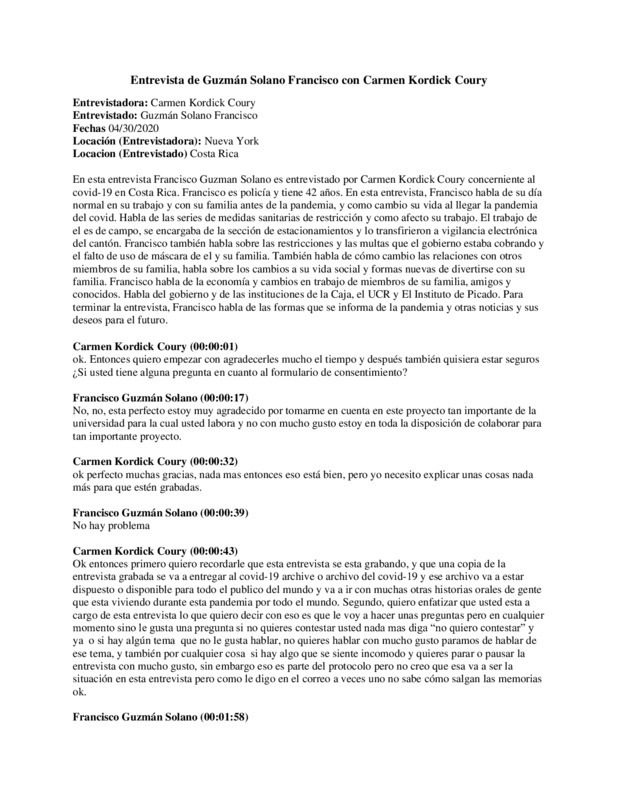 04/30/2020
04/30/2020Francisco Guzman Solano Oral History, 2020/04/30
En esta entrevista Francisco Guzman Solano es entrevistado por Carmen Kordick Coury concerniente al covid-19 en Costa Rica. Francisco es policía y tiene 42 años. En esta entrevista, Francisco habla de su día normal en su trabajo y con su familia antes de la pandemia, y como cambio su vida al llegar la pandemia del covid. Habla de las series de medidas sanitarias de restricción y como afecto su trabajo. El trabajo de el es de campo, se encargaba de la sección de estacionamientos y lo transfirieron a vigilancia electrónica del cantón. Francisco también habla sobre las restricciones y las multas que el gobierno estaba cobrando y el falto de uso de máscara de el y su familia. También habla de cómo cambio las relaciones con otros miembros de su familia, habla sobre los cambios a su vida social y formas nuevas de divertirse con su familia. Francisco habla de la economía y cambios en trabajo de miembros de su familia, amigos y conocidos. Habla del gobierno y de las instituciones de la Caja, el UCR y El Instituto de Picado. Para terminar la entrevista, Francisco habla de las formas que se informa de la pandemia y otras noticias y sus deseos para el futuro. -
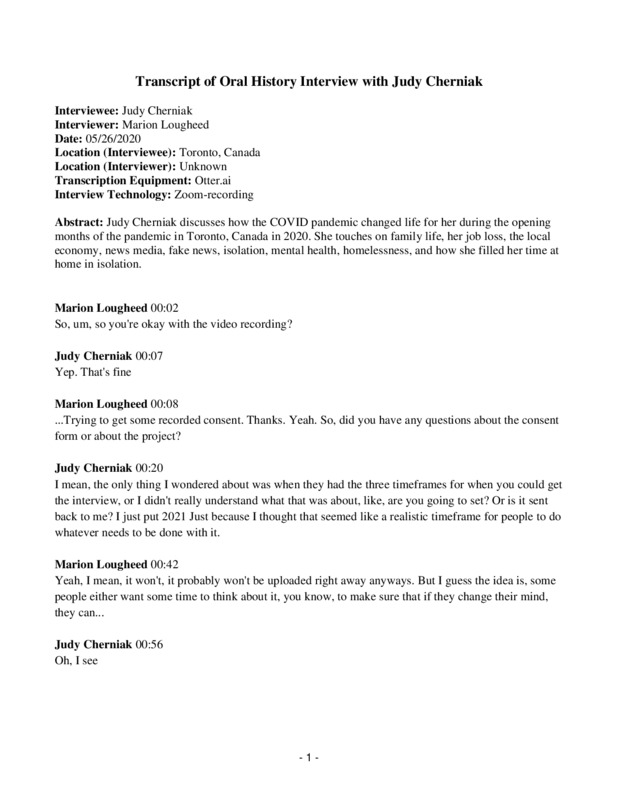 05/26/2020
05/26/2020Judy Cherniak Oral History, 2020/05/26
Judy Cherniak discusses how the COVID pandemic changed life for her during the opening months of the pandemic in Toronto, Canada in 2020. She touches on family life, her job loss, the local economy, news media, fake news, isolation, mental health, homelessness, and how she filled her time at home in isolation. -
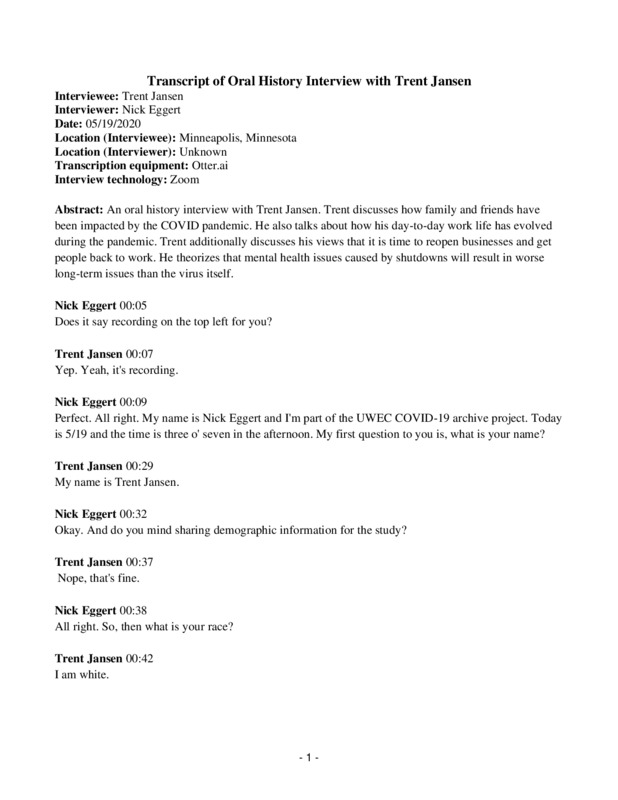 05/19/2020
05/19/2020Trent Jansen Oral History, 2020/05/19
An oral history interview with Trent Jansen. Trent discusses how family and friends have been impacted by the COVID pandemic. He also talks about how his day-to-day work life has evolved during the pandemic. Trent additionally discusses his views that it is time to reopen businesses and get people back to work. He theorizes that mental health issues caused by shutdowns will result in worse long-term issues than the virus itself. -
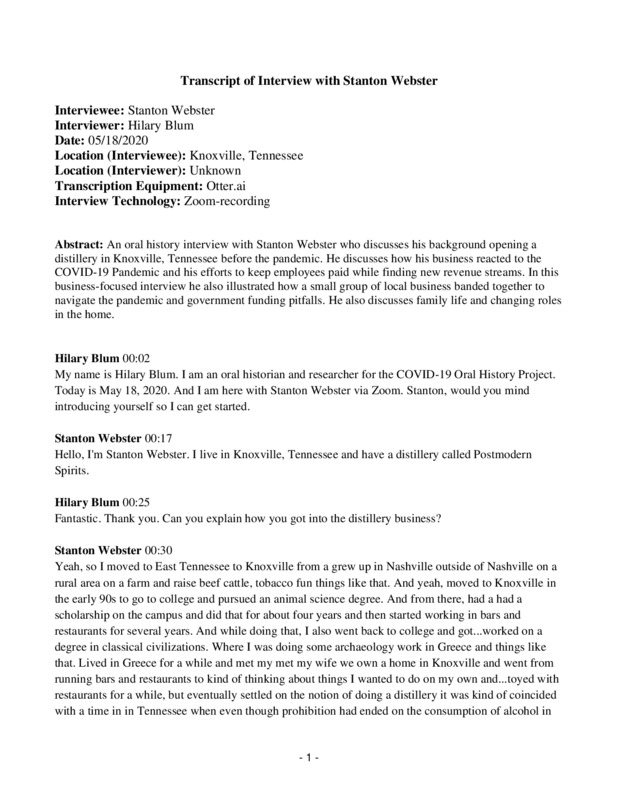 05/18/2020
05/18/2020Stanton Webster Oral History, 2020/05/18
An oral history interview with Stanton Webster who discusses his background opening a distillery in Knoxville, Tennessee before the pandemic. He discusses how his business reacted to the COVID-19 Pandemic and his efforts to keep employees paid while finding new revenue streams. In this business-focused interview he also illustrated how a small group of local business banded together to navigate the pandemic and government funding pitfalls. He also discusses family life and changing roles in the home. -
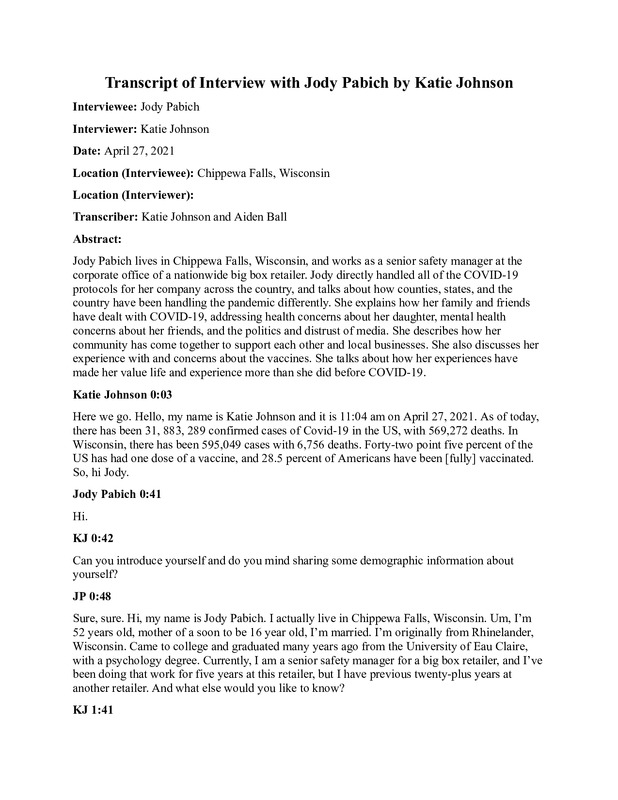 04/27/2021
04/27/2021Jody Pabich Oral History, 2021/04/27
Jody Pabich lives in Chippewa Falls, Wisconsin, and works as a senior safety manager at the corporate office of a nationwide big box retailer. Jody directly handled all of the COVID-19 protocols for her company across the country, and talks about how counties, states, and the country have been handling the pandemic differently. She explains how her family and friends have dealt with COVID-19, addressing health concerns about her daughter, mental health concerns about her friends, and the politics and distrust of media. She describes how her community has come together to support each other and local businesses. She also discusses her experience with and concerns about the vaccines. She talks about how her experiences have made her value life and experience more than she did before COVID-19. -
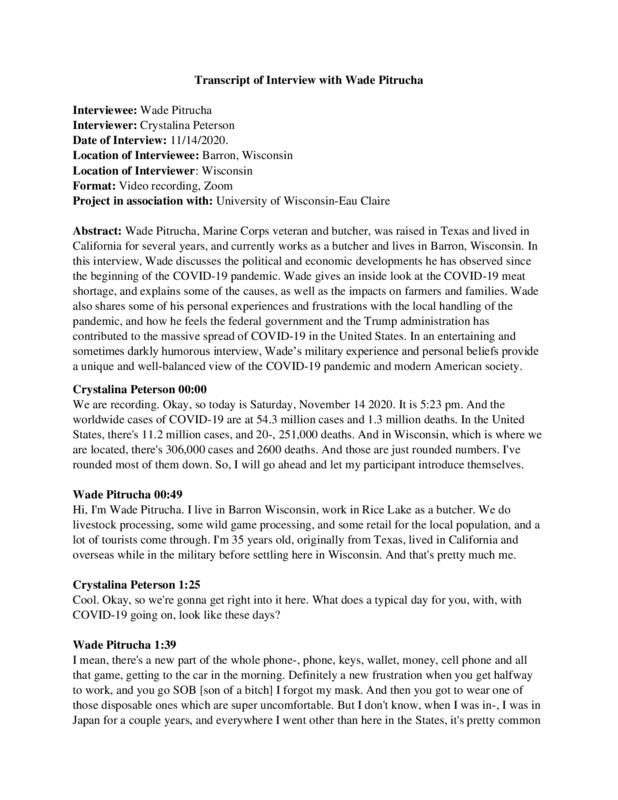 12/01/2020
12/01/2020Wade Pitrucha Oral History, 2020/12/01
Wade Pitrucha, Marine Corps veteran and butcher, was raised in Texas and lived in California for several years, and currently works as a butcher and lives in Barron, Wisconsin. In this interview, Wade discusses the political and economic developments he has observed since the beginning of the COVID-19 pandemic. Wade gives an inside look at the COVID-19 meat shortage, and explains some of the causes, as well as the impacts on farmers and families. Wade also shares some of his personal experiences and frustrations with the local handling of the pandemic, and how he feels the federal government and the Trump administration has contributed to the massive spread of COVID-19 in the United States. In an entertaining and sometimes darkly humorous interview, Wade’s military experience and personal beliefs provide a unique and well-balanced view of the COVID-19 pandemic and modern American society. -
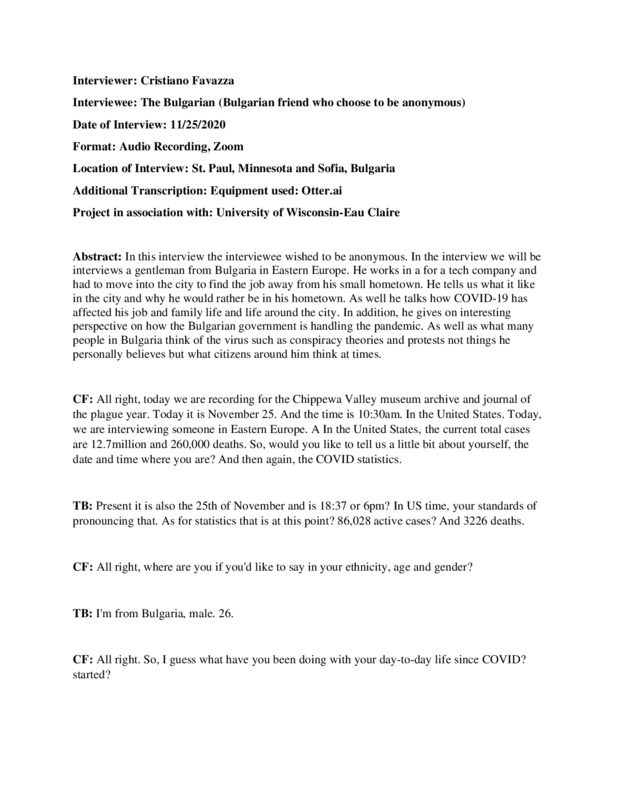 12/16/2020
12/16/2020The Bulgarian Oral History, 2020/12/16
In this interview the interviewee wished to be anonymous. In the interview we will be interviews a gentleman from Bulgaria in Eastern Europe. He works in a for a tech company and had to move into the city to find the job away from his small hometown. He tells us what it like in the city and why he would rather be in his hometown. As well he talks how COVID-19 has affected his job and family life and life around the city. In addition, he gives on interesting perspective on how the Bulgarian government is handling the pandemic. As well as what many people in Bulgaria think of the virus such as conspiracy theories and protests not things he personally believes but what citizens around him think at times. -
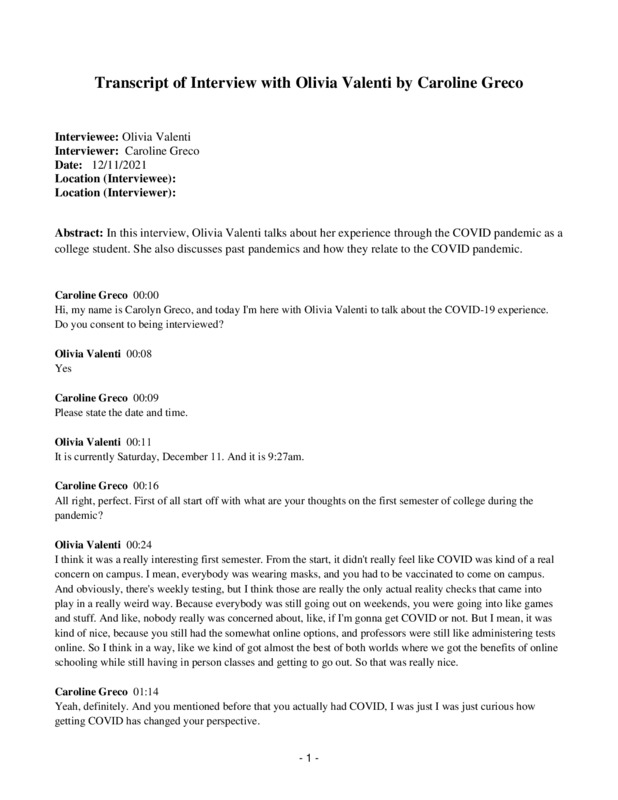 2021-12-11
2021-12-11Olivia Valenti Oral History, 2021/12/11
It illustrates what college was like during the pandemic -
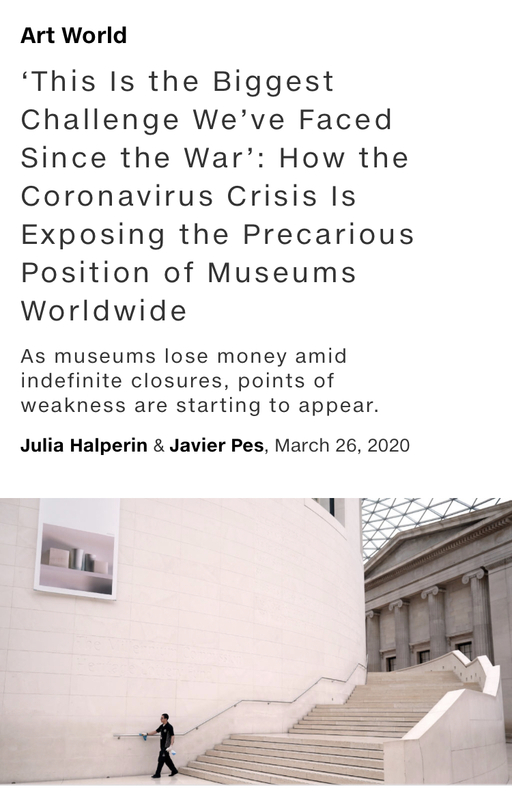 2020-03-26
2020-03-26‘This Is the Biggest Challenge We’ve Faced Since the War’: How the Coronavirus Crisis Is Exposing the Precarious Position of Museums Worldwide
The article discusses the financial hit to museums caused by the pandemic and fear and anxiety over how long museums can sustain amid a global shutdown. Whereas federal aid has come to the rescue of some museums provided by select countries for example, Germany and Britain; however, the United States does not have the same relief plans in place for cultural institutions. The pandemic has revealed weaknesses in the current museum model in relation to funding and what the article describes as a “winners take all mentality”. These problems have been compounding for decades but is the pandemic the straw that breaks the camel’s back? What might a new museum model look like if the old one is no longer sustainable? -
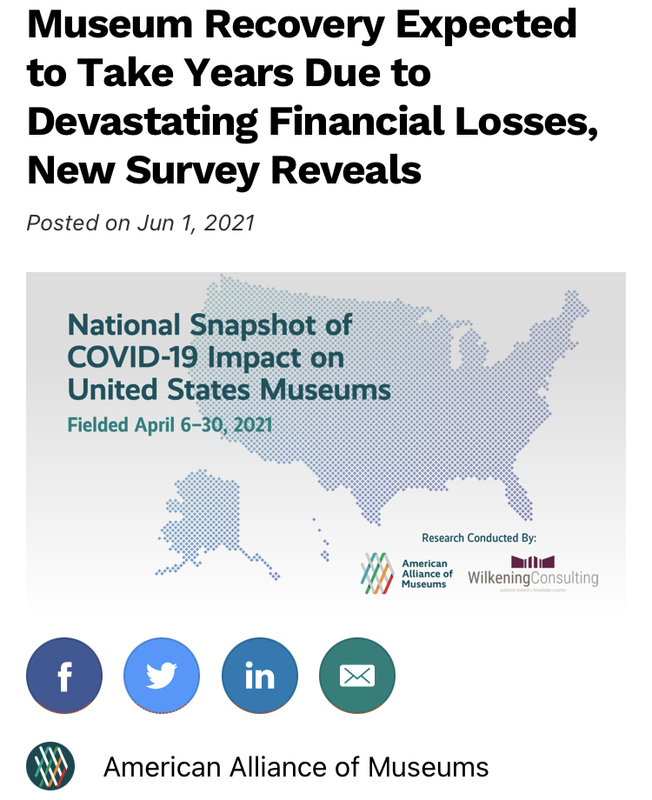 2021-06-01
2021-06-01Museum Recovery Expected to Take Years Due to Devastating Financial Losses, New Survey Reveals
The American Alliance of Museums report highlights financial problems and some of the more negative long-term impacts resulting from COVID-19 such as reduced overall net revenue for the institution, lower employment numbers, and lower average salary for their staff members. -
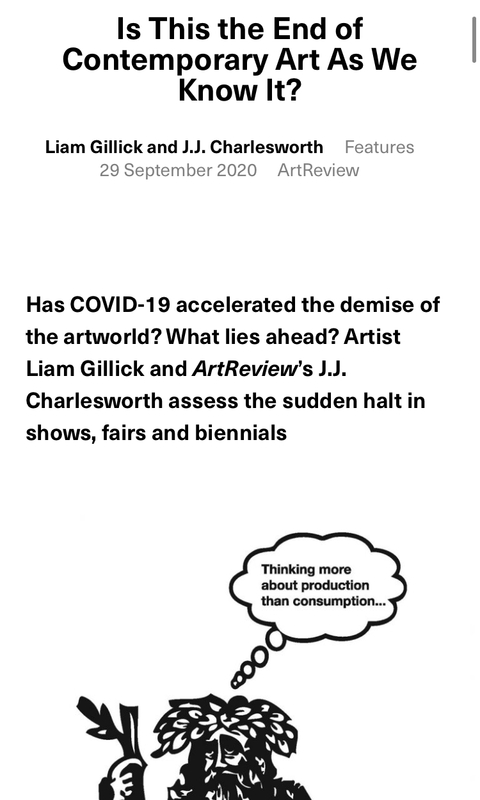 2020-09-29
2020-09-29Is This the End of Contemporary Art As We Know It?
Artist Liam Gillick and a writer for ArtReview, J.J. Charlesworth talk about the changes brought by the pandemic and the many ways that everything will most likely remain the same. Interestingly, they examine the beginning and end of “contemporary art” and the complex web of economic, social, political and cultural factors that are shifting and breaking down in different ways from our current crises. In the end, the feeling that art will survive but the idea that this particular period of art and the art world has reached its end is contemplated. -
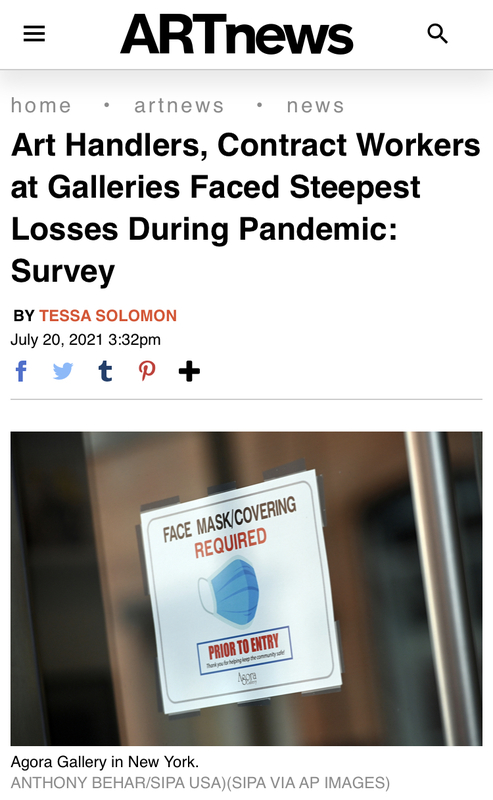 2021-07-20
2021-07-20Art Handlers, Contract Workers at Galleries Faced Steepest Losses During Pandemic: Survey
The ARTnews article uses ADAA (Art Dealers Association of America) data from their official survey to consider the far reaching implications of the pandemic on the art world. Examples of staggering job loss in art handlers and contract workers in particular provide a look into possible changes in the artillery model for the short term while in lockdown. Quantitative data on online art fair participation, and percentages of galleries that received the PPP loan are included as well. -
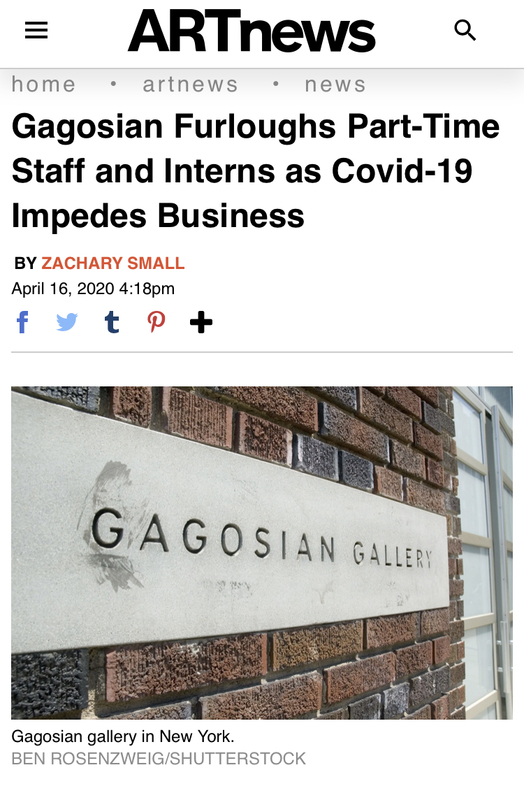 2020-04-16
2020-04-16Gagosian Furloughs Part-Time Staff and Interns as Covid-19 Impedes Business
All galleries felt the immense economic pressure of shuttering their doors. There was uncertainty and furloughs or imminent possibility of losing ones job was a looming presence especially in the spring of 2020. Even international blue-chip galleries like Gagosian were financially struggling. Those that lost their jobs were The article discussed job loss - whose jobs - and what this means for the art world in the present and in the future. Other methods of main tenting financially during the pandemic included furloughs and salary cuts where the percentage was determined by how much someone made per year. -
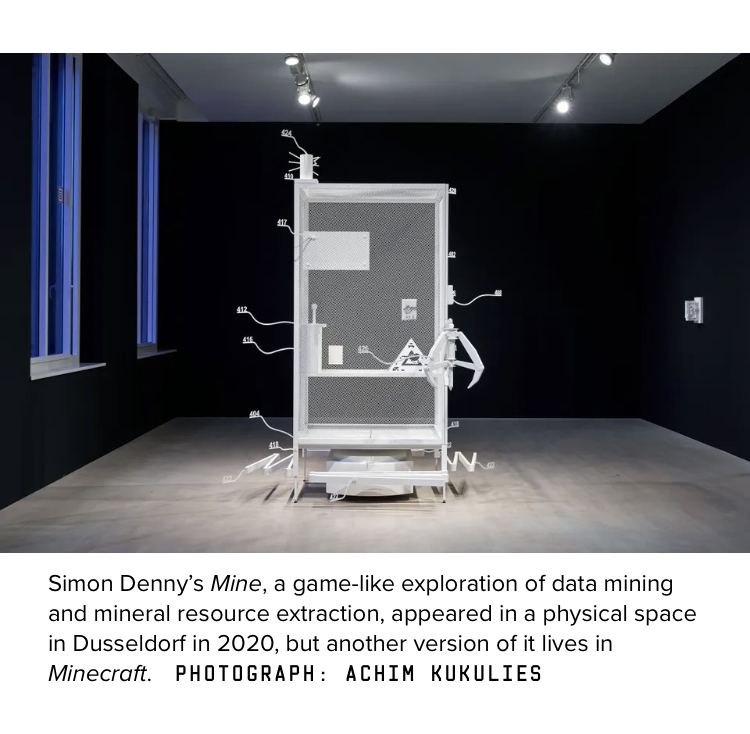 2021-02-09
2021-02-09Artists Reimagine How Covid-19 Will Shape the Art World
This Wired piece by Lydia Horne starts off with a really interesting point about the viewer relationship with art as social distancing before Covid and the distance in museums and galleries for the artwork’s protection. It is more than just considerations about virtual auctions and virtual viewing - the way that the art itself translates is something that many artists are struggling with. The article also speaks to the ways that artists are redefining themselves and their work. The changing structures and changing methods reaching an audience or sharing work, some artists are using the pandemic to explore possibilities to reshape the art world. For example, non-profits and community-based models instead of the traditional gallery model. -
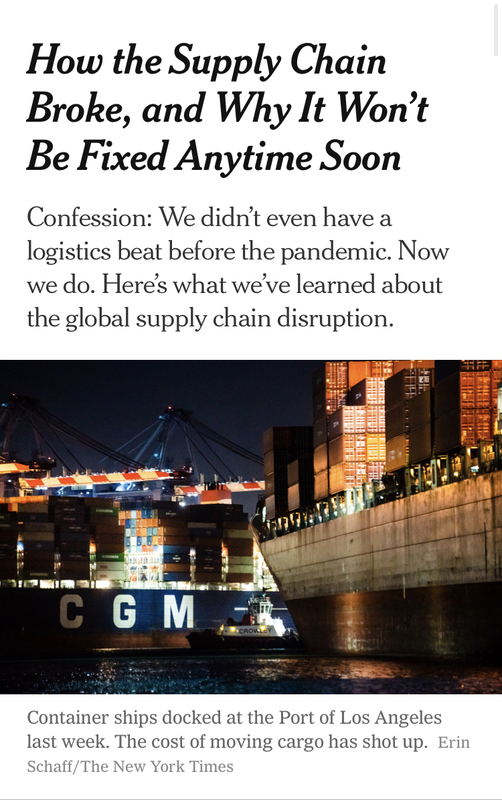 2021-10-22
2021-10-22How the Supply Chain Broke, and Why It Won’t Be Fixed Anytime Soon
This New York Times article from October 22nd, 2021 - updated October 31st - explains the current status of the global supply chain. Global Correspondent, Peter S. Goodman, writes that Covid exacerbated existing problems in the supply chain. This is relevant to the art industries in ways people often overlook. Coordinating shipments to meet deadlines in international art exhibitions, loaning works or consigning are all things that I used to struggle to plan for in light of covid when there would be unprecedented shipping delays and costs. Additionally, clients always want lower costs for shipping newly acquired works, however, it is now even more difficult to marry sales and client relations with the realities of shipping. -
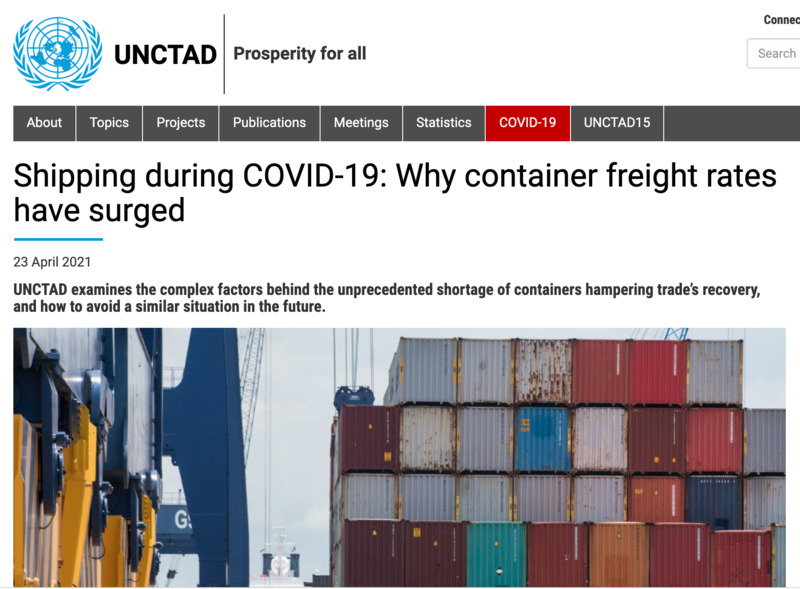 2021-04-23
2021-04-23Shipping during COVID-19: Why container freight rates have surged
UNCTAD (United Nations Conference on Trade and Development) included an article on their website which examines the shipping container shortage. More broadly, it comments on the staggering domino effect of the pandemic on industry and consumers and offers future solutions for avoiding current problems. The article concludes with a section that provides insight into how to avoid shipping container shortages in the future. -
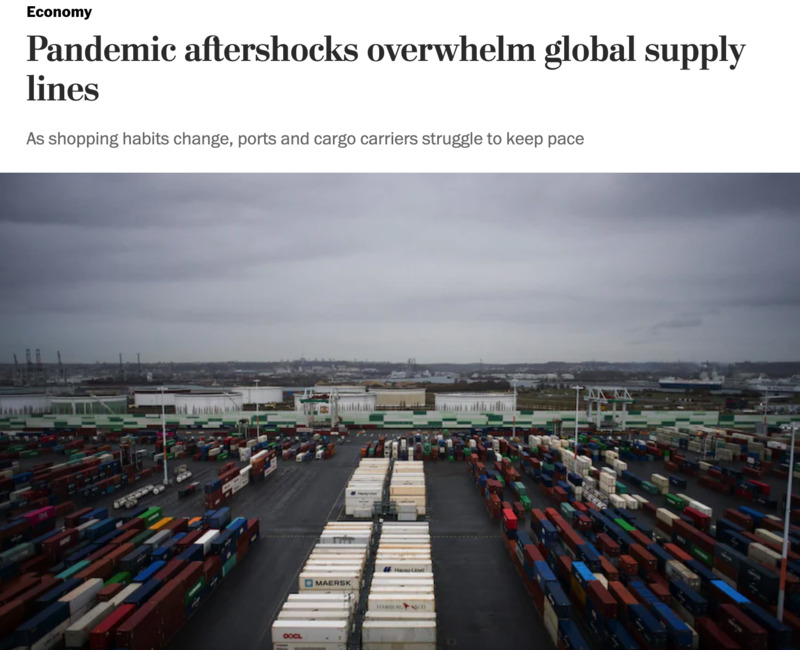 2021-01-24
2021-01-24Pandemic aftershocks overwhelm global supply lines
The Washington Post article discusses the disruptions in the supply chain and the repercussions such as inflated prices, failure to meet schedules, and effects on different industries. The domino effect was set off by the pandemic but we continue to see the fallout. Shipping artwork is a cost that galleries, advisories, collectors, and museums have to factor into their finances. Inflation in the cost of international shipping in particular and unpredictable delays negative effect openings and coordinating with clients and vendors. -
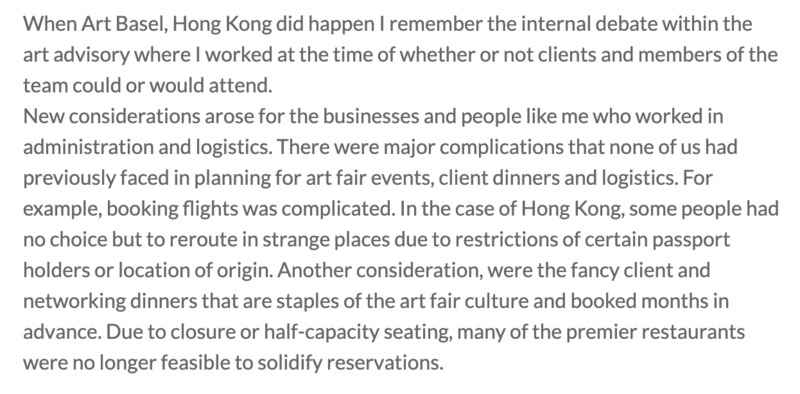 2021-05
2021-05Financial vs. Public Health In Planning for Art Fairs
When Art Basel, Hong Kong did happen I remember the internal debate within the art advisory where I worked at the time of whether or not clients and members of the team could or would attend. New considerations arose for the businesses and people like me who worked in administration and logistics. There were major complications that none of us had previously faced in planning for art fair events, client dinners and logistics. For example, booking flights was complicated. In the case of Hong Kong, some people had no choice but to reroute in strange places due to restrictions of certain passport holders or location of origin. Another consideration, were the fancy client and networking dinners that are staples of the art fair culture and booked months in advance. Due to closure or half-capacity seating, many of the premier restaurants were no longer feasible to solidify reservations. -
 2021-05-21
2021-05-21“'It’s impossible to compare 2019 and 2021; it’s a completely different world': what has sold at Art Basel in Hong Kong”
Art Basel, Hong Kong did finally happen in person in May 2021. In the article, Lisa Movius discusses the reception to the hybrid-model art fair, the change in demographic, noteworthy sales, and spotlighted works, artists, and gallery booths. -
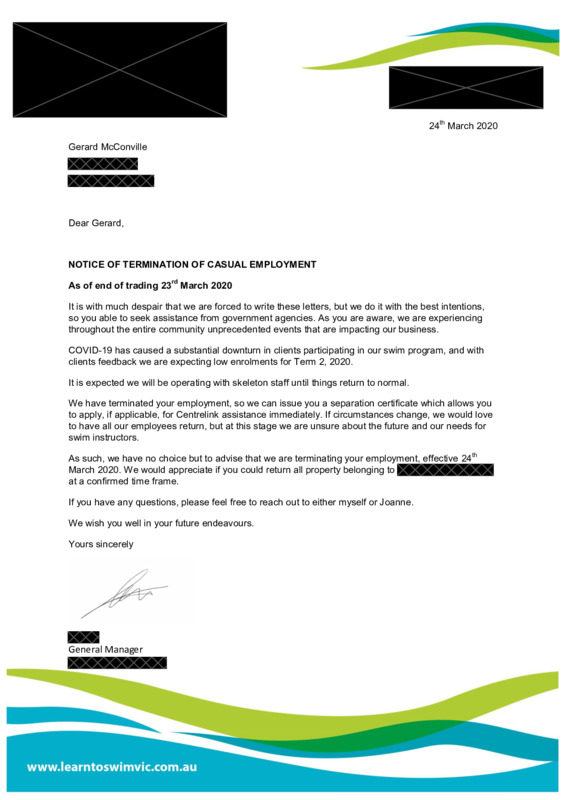 2020-03-01
2020-03-01Letter of Termination - HIST30060
In March 2020, my former place of employment was forced to close down as a result of lockdown restrictions. This was the only communication given to employees about being let go. I had worked at the company for four years at the time from the age of 16 through to the time I was 20. I have redacted some of my own personal information as well as information that could give the company away. The swim school did not manage to reopen at full capacity for almost a year and many staff did not return to the school as they found other employment. -
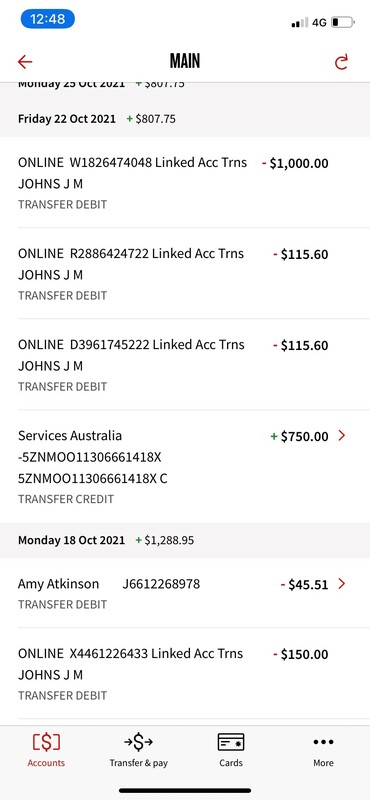 2021-10-01
2021-10-01(HIST30060) Disaster Payment: "Getting Payed to Study"
HIST30060. The COVID-19 Disaster Payment, given to workers unable to earn income due to COVID-19 state or territory health order, was given to construction workers during the two-week construction shutdown in Victoria. Traffic control in the construction sector has been my casual job alongside university for the past three years. The recent construction shutdown, however, allowed me to receive the $750 a week from the Disaster Payment without working at all. My housemates and I called this “getting paid to study”. This was especially true in the lead up to exams were we spent the majority of time at home with very little excuse to do anything other than “hit the books”. -
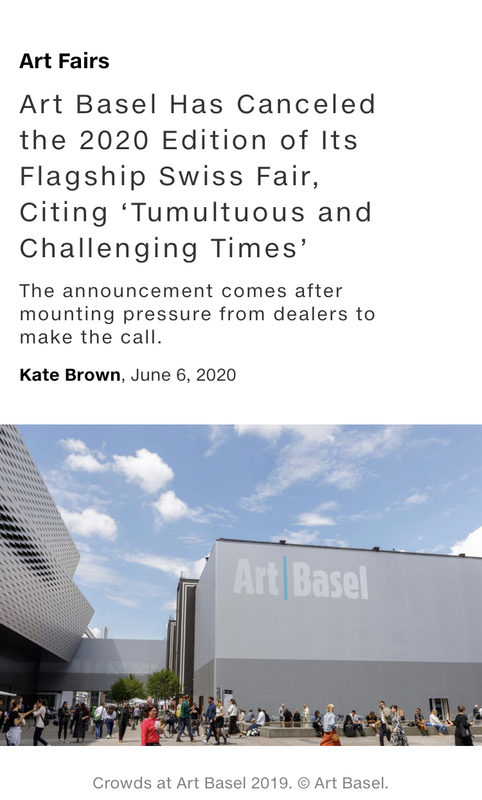 2020-06-06
2020-06-06"Art Basel Has Canceled the 2020 Edition of Its Flagship Swiss Fair, Citing ‘Tumultuous and Challenging Times’"
The Artnet article discusses the trepidation in decisions to resurrect in-person events, specifically annual international art fairs. Businesses and institutions prematurely made plans for the reopening of in-person events in the summer of 2020 in hopes of recouping money lost during the initial lockdown in the spring. Art fairs are premier money making events and networking opportunities in the contemporary art world that are ultimately economically beneficial for gallerists, art advisors, fine arts shipping companies, local restaurants and businesses, and hotels alike. Organizations such as Art Basel rake in enormous sums of money each year through their hosting of mega-art fairs in various international locations. The article focuses on Art Basel’s announcement of yet another change in the program for Art Basel as the art world grapples with the decision of public health versus economy. The fair looked to digital alternatives as a way to sustain in the interim. -
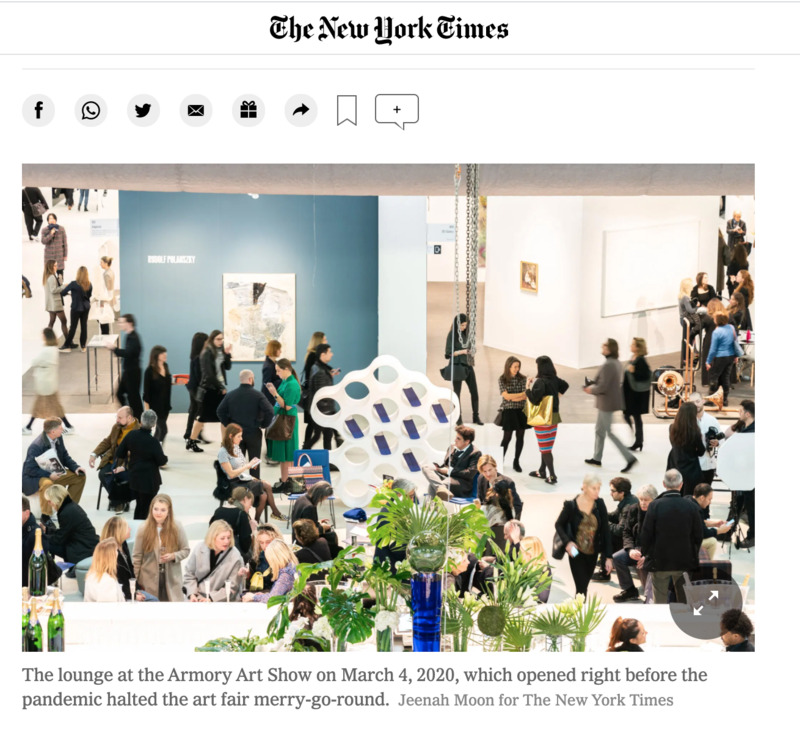 2021-08-27
2021-08-27"New York Art Fairs Are Returning, Eyes Open and Fingers Crossed"
The New York Times article from August 27, 2021 discusses the anticipation for the Armory Show 2021 edition to go forward after many art fairs decided to cancel this year’s editions in light of the decline in progress since the resurgence of the coronavirus in the summer of 2021. The article also comments on the changes in the art world, lower attendance, loss of participating galleries and a shifting demographic. There has been a notable transition away from blue-chip gallery-centric art fairs to include smaller businesses, in which many more are women-run and or owned by people of color. -
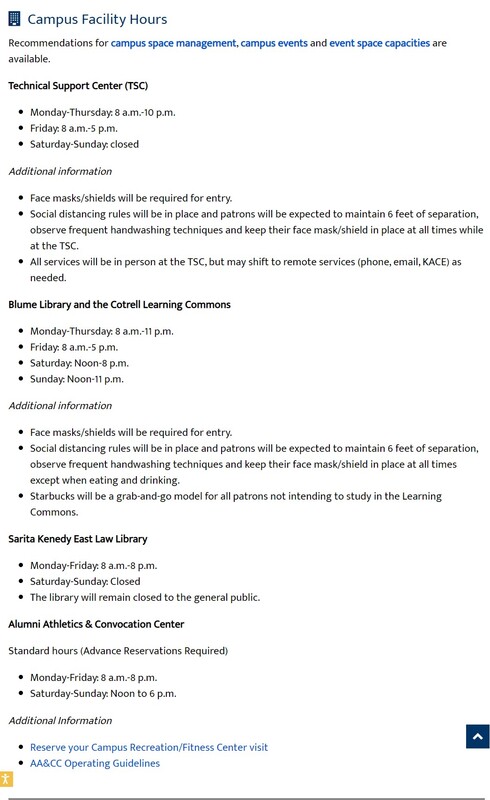 2021-10-27
2021-10-27Hour Alterations
The pandemic brought a lot of changes in our work environments and that includes the changes in business hours. At St. Mary's University, these screenshots show the hour alterations to on-campus facilities, since January, and the new rules that are to be followed by all. -
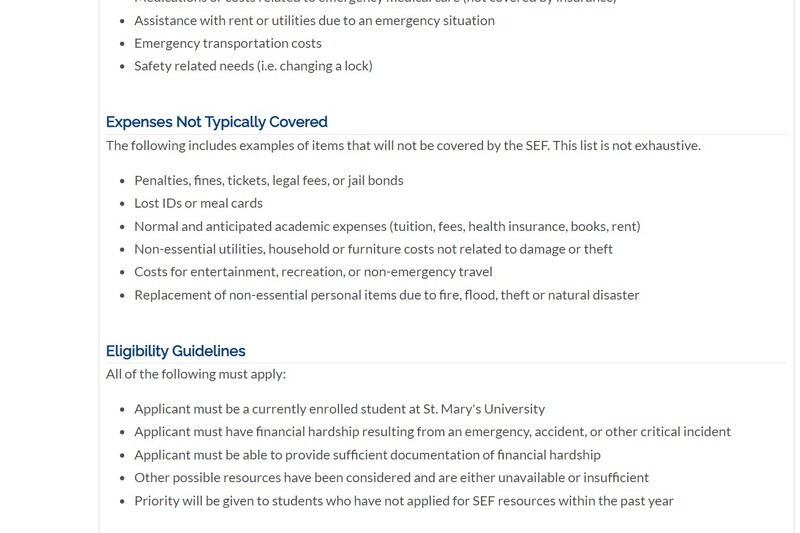 2021-10-27
2021-10-27Economic Student Support
The Student Emergency Fund at St. Mary's was part of an economic relief through the CARES act; where students got financial support via the university. I personally used this fund to help pay for school and basic necessities, like food and bills. It was a relief that students, like myself, were able to obtain this financial support throughout the pandemic and it's still available for all students. -
2021-10-17
The Covid Disconnect
The story and my experience are an example of the many ways in which the pandemic affected individuals in different ways. It goes without saying that each person was impacted in varied ways due to Covid-19, however, not all of them were either explicitly negative or an outcome that is easily defined as being either beneficial or harmful. During the height of the pandemic in the United States, I was employed as an Assistant Warehouse Manager in Green Bay, WI. My workload and responsibilities were already a little taxing, but once things got in full swing with Covid they became even more so. I went from working an average of 60 hours a week to over 75. This was mainly due to about a third (or more) of our employees being out of work due to quarantine-type measures or actual illness. This went on for months at the beginning. Many weeks out of that time period there were as few as about a dozen of us running three shifts in a warehouse that normally employed roughly 40 workers. Also at this time, my wife became unemployed because her place of employment shut down. Others around me were losing their jobs in droves and facing financial hardship. But due to my position and the nature of the job, I had never had more job security and we never faced any kind of financial difficulties. On the contrary, during the entire pandemic, my wife and I never went without or struggled. This gave me a surreal feeling and one that I almost felt guilty for living through. Aside from some minor changes in my daily life, I barely noticed any personal changes due to Covid. All in all, it was an extremely odd time to live through; the pandemic wasn't necessarily bad for my wife and me, but I know it was for countless others. And that made it all the more strange. -
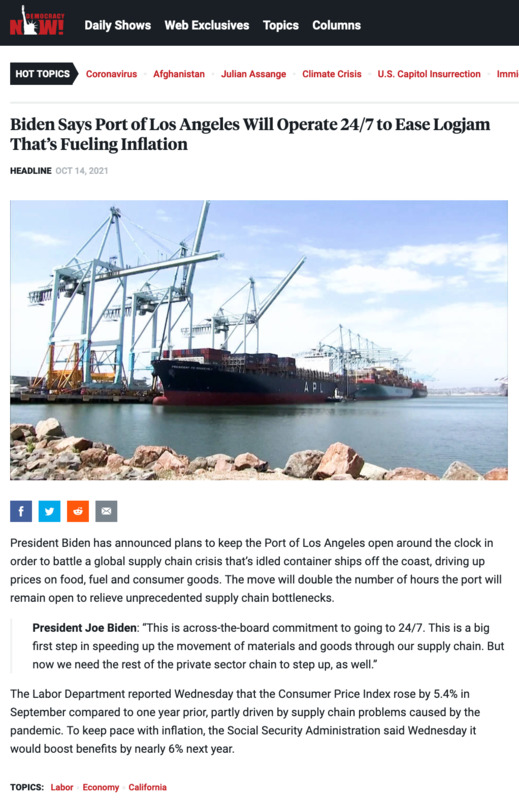 2021-10-14
2021-10-14Biden Says Port of Los Angeles Will Operate 24/7 to Ease Logjam That’s Fueling Inflation
The global supply chain crisis has led to some unprecedented steps to regain efficiency. How much more recourse do the public and private sectors have? -
2020-06-01
Beautiful Silence in Paradise
Hawaii is a very unique place in terms of its beauty and overall welcoming atmosphere. I grew up knowing how popular of a destination spot my state is and how in many ways we are extremely dependent on outside sources to fuel our small island economies and businesses. I had thought that aspects I had become used to seeing, such as the extremely busy downtown shopping and tourism part of Hilo, would never change. The many common things you'd have smelled seen and heard were the many cars out on the road, the overfilled wastebaskets by every park and beach, the tents of entire families at many of the beaches, and the constant rush of modern living in Hawaii. Then in March through April of 2020, the university in which I was attending at the time made the big decision to cancel in person meetings for the foreseeable future. The days of constant business and crowded areas in a matter of weeks ceased to be. In late April continuing until recently, the most common things you would see empty streets, closed signs, empty parking lots, and most importantly of all, you would actually get to smell the salt of the water from the ocean, the chirping of birds by the dozens in commercial areas, and even the return of sea turtles to what were known to be crowded beaches. It’s as if the lack of tourism and industry during Covid-19 gave us local residents a new perspective of our home. One where it felt like we could finally breathe and stretch out our legs for a bit while we dealt with the pandemic effects. -
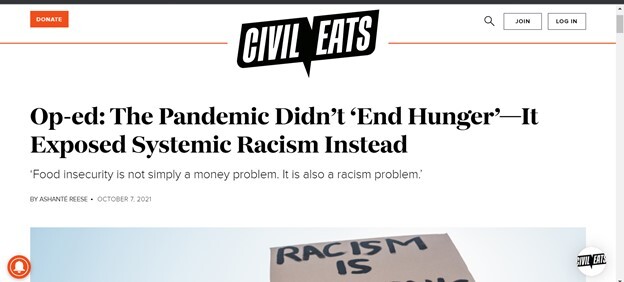 2021-10-07
2021-10-07Exposing Systemic Racism in all Areas
While some believed the pandemic aid solved food insecurity, that couldn't be further from the truth in black neighborhoods. -
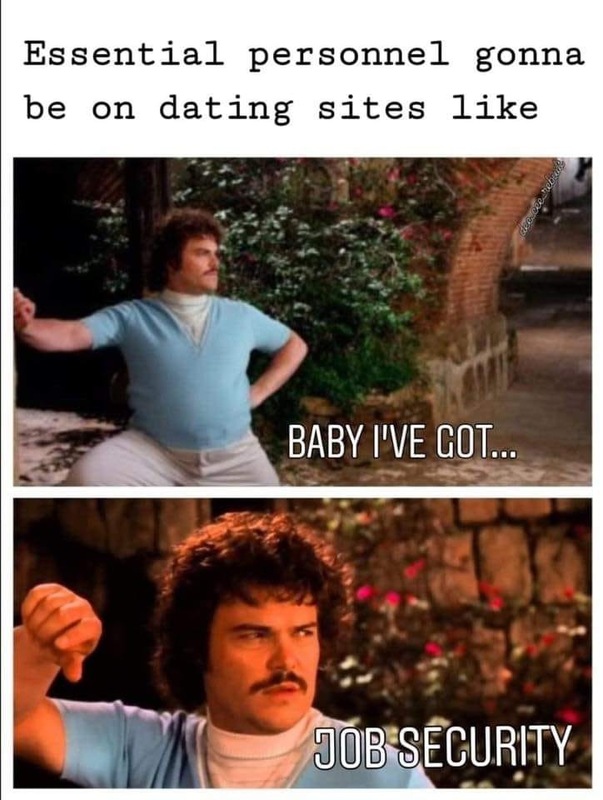 2020-03-22
2020-03-22Job Security as an Essential Worker Pride-A Meme
When the pandemic first took place, I was working as an Executive Assistant at a Domestic Violence Agency. Our agency was initially sent home, which prompted a mad dash to learn how to hold Zoom meetings, how to securely set up working from home, getting laptops and printers to workers, and all of the other craziness associated with a rush to work from home. The first day we were sent home, I spent the day learning Zoom, checking emails and answers phone calls and texts. That was a Friday. On the following Monday, I was back in the office. No one else was there, so I could do a lot work without interruption. It was determined that our work as a domestic violence agency was essential. At the time, that was a major relief for this single mom of three girls. I remember feeling panicked about the possibility of needing to go on government aid or unemployment. So, it was a total relief to me to find out we were essential. I worked hard during that time to. It took more effort and energy to help others work from home. I was glad that I could work from my work office, but it still required a lot of extra work. After things settled a bit, I would hear about how much more people on unemployment received. It was frustrating to hear about honestly. But, at the time, this meme was exactly how I felt. I felt a lot of pride to be considered essential even if it meant more work (for less pay). -
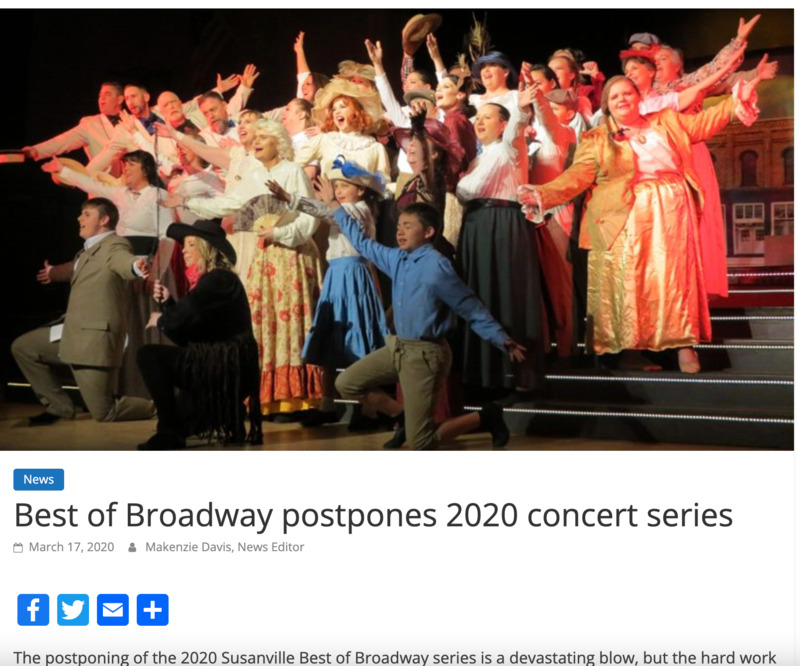 2020-03-17
2020-03-17Performance Cancelled a Day Before Opening Night
I am the board president for a local theater company, in a small town in Northeast California. For over 20 years, the production Susanville's Best of Broadway has produced a yearly concert series that features snippets from several different Broadway shows. Our production is 100% volunteer and is run by a production manager and a production team. Our cast runs over 100 people every year and includes community members of all ages. Our 2020 production was an epic year for us, as we had spent a lot f money on props, backdrops, and costumes. Several of the shows included Hamilton, Waitress, and my personal favorite Wizard of Oz (to name a few). Our production team started in April of 2019 to plan and the cast started to rehearse in January 2020. The cast would show up to rehearsals 6 days a week for 10 weeks. Two days after the pandemic was announced nationally, was supposed to be Susanville's Best of Broadway Opening Night. We schedule a total of 7 shows over two weekend. The day before opening night, our local public health team reached out to me. In a stressful meeting with the public health team and the Broadway board of directors, it was determined that we had to cancel our show. We attempted to do whatever we could to modify and change things, including social distancing, but pubic health was worried that if someone got sick from our show, we would end up with some sort of lawsuit we couldn't handle. They did, however, allow for us to present to anyone who had been at rehearsal, which included some family members and we called it a rehearsal. It was a sad night. Performing to an empty hall was sad. The cast cleaned up their belongings with hope that we would reopen in a couple of weeks. Not only were we unable to open the show, but we were unable to perform a concern series in 2021. Thankfully, plans are underway to have a performance in 2022. -
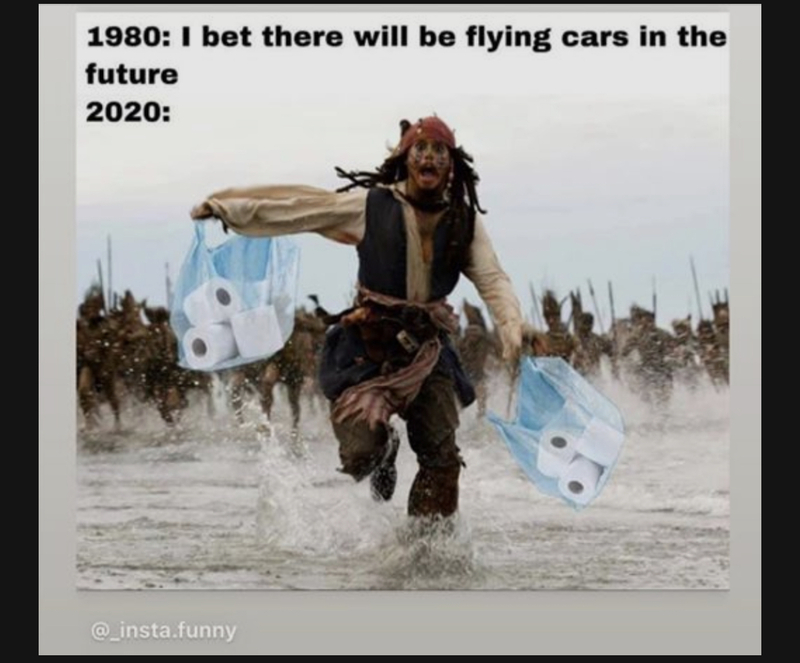 2020-05-14
2020-05-14Toilet Paper Crisis
At the beginning of the pandemic, people were stockpiling toilet paper and cleaning supplies. -
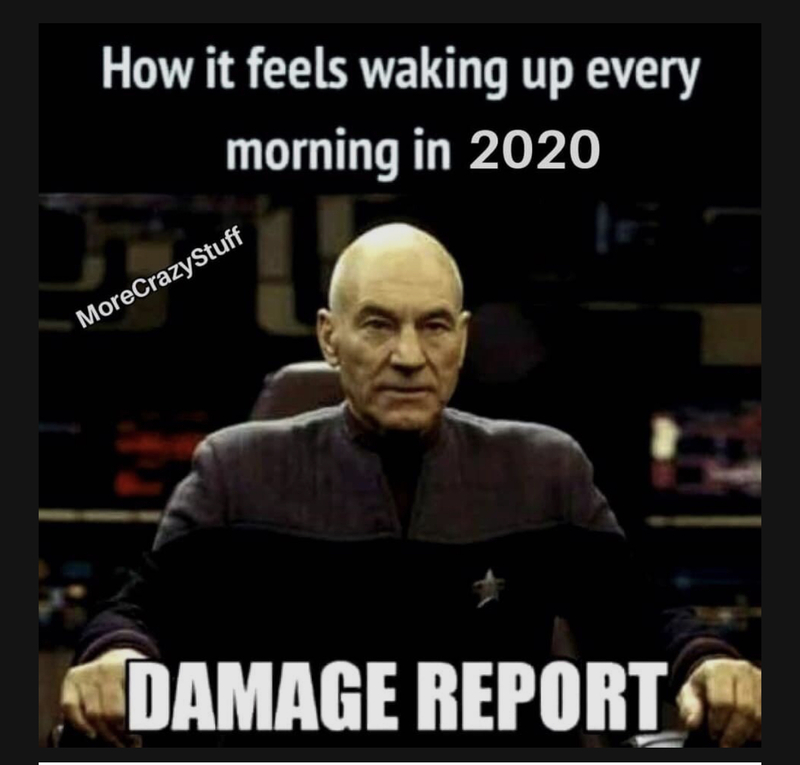 2020-05-09
2020-05-092020 Daily News report
Everyday when we woke up, it felt like the news was reporting on nothing but Covid-19 cases. This is how we all felt every morning -
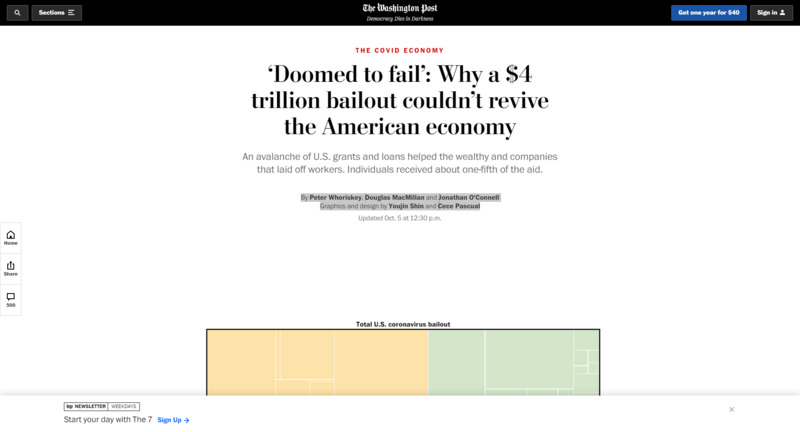 2020-10-05
2020-10-05Who Received Pandemic Money?
This article shows how the economic bailouts of the pandemic helped large corporations much more than they helped impacted individuals. Since the beginning, we've seemingly been supporting and encouraging essential workers. The support can be identified as fraudulent because according to the Washington Post, big companies that employ essential workers didn't use their bailout funds to support their workers. Billions of dollars went out but aid is still running low where it matters the most, with hardworking citizens. -
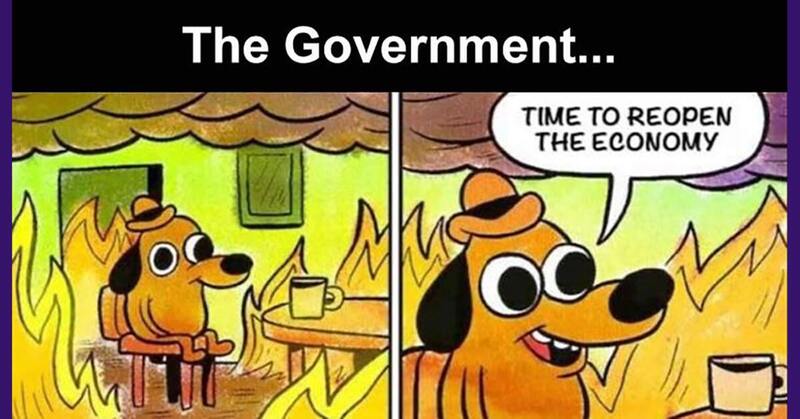 2021-05
2021-05Reopening too Soon
In many states, the government seemingly ended mask mandates and opened back up in one day. Washington State lifted mask mandates and reopened everything at 100% only to reinstate mask mandates and reduce compacity a few weeks later. This has lead to the meme of everything is on fire but let's just reopen anyways. -
2021-10-06
COVID-19: The Impact of Power, Gender, Race, and Religion
Life during the COVID-19 pandemic is something that no one could have expected or prepared for. The way that our everyday lives instantly got disrupted and for many people their lives turned completely upside-down. We went from going to concerts, shows, and movies with friends and family, to lockdown in a brief second. Yet, for everyone lockdown, quarantine, and even work all looked different. There were many factors that went into trying to be able to stay safe and healthy during this time. Not everyone had the same advantages to try and protected themselves and their loved ones; some of the driving forces behind the advantages or disadvantage were power, gender, race, and religion. The more power, money, influence that you had during 2020 was what could almost guarantee that you and your family would be okay. By having money and power one was able to by as many masks as they wanted or by as much disinfectant as they could. Those people didn’t need to worry about if they could afford the inflated prices of hand sanitizers and Clorox wipes (if they could be found). Having power and money meant having information and accesses. This meant that those who possessed these things, could have accesses to doctors for healthcare purposes but also to get information about what was happening in their local area. With the possession of money also came space. Besides disinfectants and good masks such as N95s or KN95s, space was the next most luxurious thing people could have. Having space meant that you and your families weren’t all crowded on top of each other even if that’s how many people felt like they were because of lockdown. Having space also meant that if one of your loved ones got COVID-19, there was an area for them to quarantine and not but the rest of the people in the house at risk. Power and money were what separated those who could afford to stay at home and be safe and have minimal disruption to their lives, and those who still had to leave the house every day, if they were some of the fortunate ones to have jobs and put their lives at risk to try and provide for their loved ones. The way that gender was impacted by COVID-19, was that for lots of family’s stereotypical gender roles were reversed in some cases or even ceased for a bit. With everyone spending so much time at home, there was no more reason for any one person to be doing either the housework, looking after the children, or even doing all the cooking. While it is not just women that stay home with children, plenty of men to do, it is a stereotype that most women stay home with the kids and that the men work. Well with many people working from home or unfortunately being unemployed the jobs that typically might have fallen on mom became a mom and dad job. However, gender was not only impacted in these ways. While COVID-19 was already a hard, tough, and sad enough event domestic violence rose drastically during lockdown. Because people were forced to stay home, women especially since they are the dominant gender affected by domestic violence, had no option but to remain in the same environment as their abusers. This is not to say that men did not face the same situations but in America, 77% of domestic violence victims are female. Race played a huge part in the treatment of those with COVID-19 as well as accessibility to masks, disinfectants, and other forms of PPE. Areas all around the country that were not primarily made up of white people, were hit the harder with COVID-19. These groups of people were not given or provided the same level of care or protections that those where were white did, during this crisis. People who were any race other than white were treated as second class citizens to those who were white. They tended to be forgotten about by the healthcare system or were not prioritized the same way those who were white were. The color of your skin during 2020 could have been the difference between living or dying due to COVID-19. Religion was one of the biggest debates that surrounded the entire COIVD-19 pandemic. Religion was the cause for fights, violence, and even deaths of thousands of people. People used their belief in religion as a reason for why they did or did not believe in many parts of COIVD-19 crisis. One of the oldest debates in history is religion versus science, and this debate in modern times has never been so present in every part of the country and many parts of the world. Not only were people’s personal beliefs in religion playing a role in the chaos of the pandemic, but the attendance of religious gatherings such as church and temple causing issues as well. As a result of millions of people choosing to still attend religious gatherings, they were spreading the virus because of being in such close contact with many people. Even when there were executive orders in place prohibiting gatherings of over a certain size to prevent the spread of COVID-19, people still felt it was their right to go to these gatherings. The COIVD-19 pandemic impacted and altered the lives of billions of people. There are lots of factors that played a part of making the pandemic better and making the pandemic worse. However, at the end of the day the ones that were the most prominent were power, gender, race, and religion. -
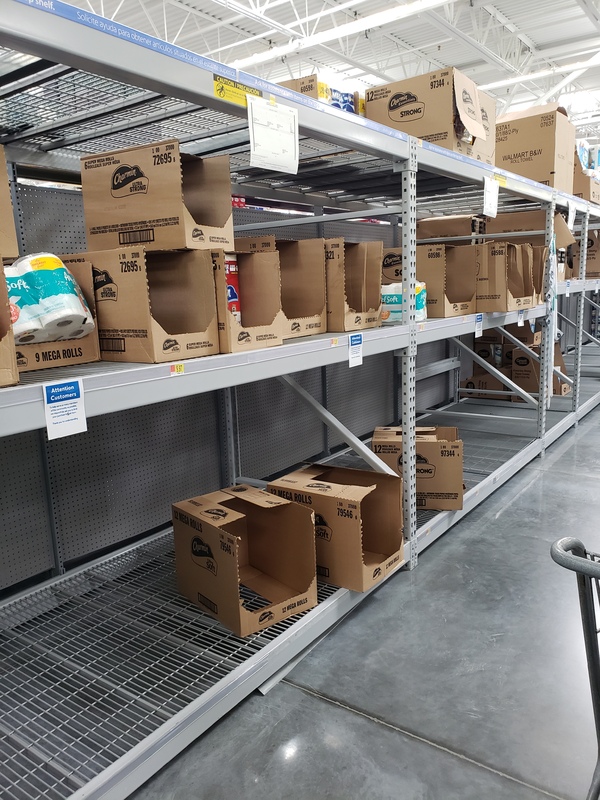 2020-06-09
2020-06-09Toilet Paper Panic
This image demonstrates the panic-buying of toilet paper at a Walmart store in Katy, Texas. Attached to the shelves there are signs limiting customers to one pack. However, the customers had taken the toilet paper so quickly there had been no time to remove empty boxes. I'm not sure anyone predicted or fully understood the obsession of toilet paper hoarding at the beginning of the pandemic. Yet, it is one item that I continue to buy often to keep a stock in my garage. I think that internal panic of hoarding toilet paper is something that will always stick with me. It is a piece of the legacy of the COVID-19 pandemic. -
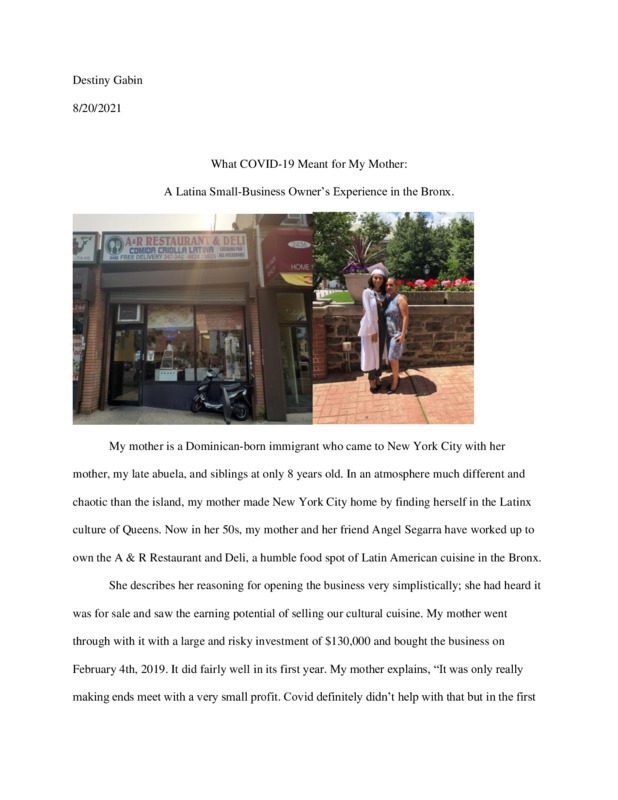 2021-08-22
2021-08-22What COVID-19 Meant for My Mother: A Latina Small-Business Owner’s Experience in the Bronx.
The item I am submitting is a pandemic auto-ethnography detailing the disproportionately negative impact of COVID-19 on Latinx businesses. I do so through the narrative of my own family's experience, specifically my mother, as well as supporting academic research of general demographic trends. This piece speaks to how the pandemic, while in and of itself does not discriminate, has proportions of its impact that demonstrate a systemic bias leaving certain racial and ethnic groups less protected and far more targeted than others. The piece also connects how these discrepancies are not products of the pandemic, but rather were already systemically there and exacerbated by the pandemic. -
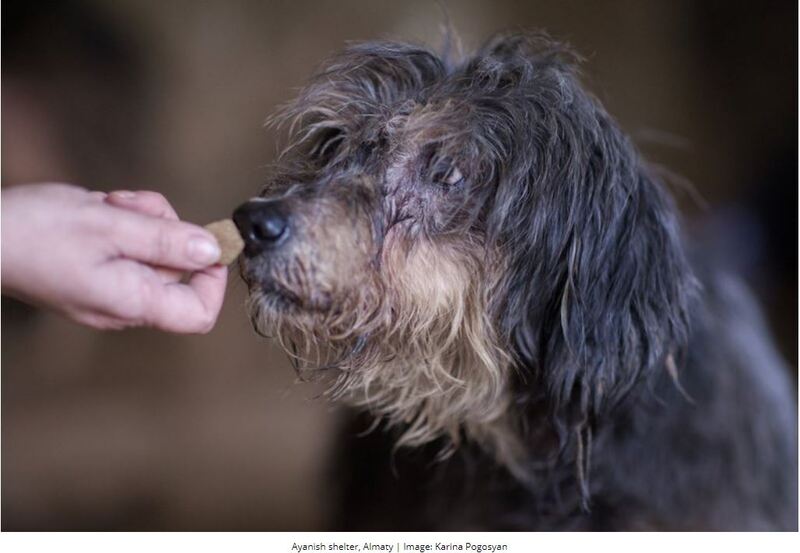 2021-03-10
2021-03-10Pandemic downturn leads to animal abuse crisis in Kazakhstan
Kazakhstan is facing a multitude of problems, including a weak currency, dependence on fluctuating oil prices, a closed political system and dire human rights. Amid all of this, the fate of its abused pets may seem trivial. However, passionate activists are rising up to take a stand for animal rights. As the Central Asian state’s socio-economic conditions have worsened over the past year due to the pandemic, more pet owners have been abandoning their animals or committing violence against them. And just as animal shelters are more needed than ever, they’re grappling with an influx of animals, a lack of funding and a legislative vacuum on animal rights. -
2021-08-09
THE19: Howl of a Mad (American) COVID-dodger, a Dia-Rant
A year from the perspective of an immuno-compromised, mulitple comorbidities survivor stranded in place until vaccine in a poor, rural, underserved and politically conservative Colorado ski and summer resort community over run by affluent COVID torurism. -
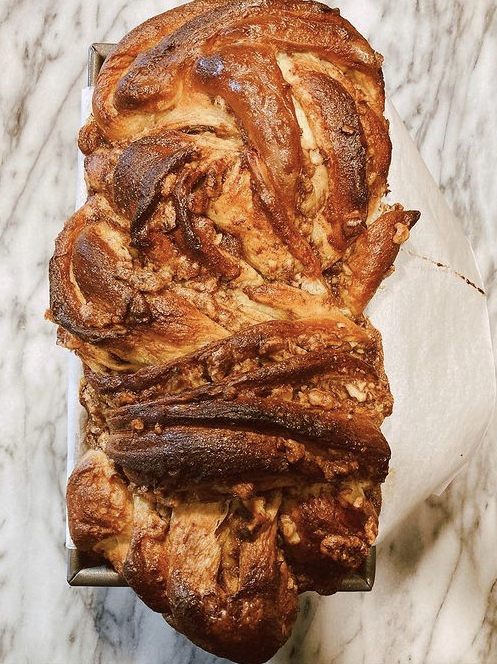 2021-03-21
2021-03-21A tale of the babka
If you had asked me if I was a baker prior to the year 2020, I would have unequivocally said no. A cook? Yes. But a baker? Absolutely not. But that was before the global Covid-19 pandemic. I worked in the cruise industry prior to the pandemic and I travelled a lot for my job. I was not home enough to really jump into and try to master baking. Following mandatory quarantine in March 2020, I suddenly had extra time on my hands. Further, I was laid-off from my job in early June and ended-up with even more time on my hands. Like so many around the world during quarantine, I took up baking. But unlike the many who tried sourdough, I started with making standard wheat breads and then went straight to enriched breads like babkas or challahs. The photos I am attaching here show my progression as a baker. My first babka was fine and tasted great, but as you can see, I have improved in technique and in flavor over time. My favorite babka recipe comes from King Arthur Flour. As a new baker, I relied on the King Arthur Flour website for flour and yeast tips, baking tools, and recipes. I was too hesitant to add walnuts the first time and I accidently used a quick-rise east instead of standard yeast. As time went on, I felt more comfortable adding walnuts and raisins. I also felt more comfortable working with the dough to perfect the twisting technique of the babka. I relied on trial-and-error for most of my recipes, but I also watched all episodes of the Great British Baking Show and found some videos that gave me the basics of flour, yeast, and water. My family were very surprised by this newfound baking skill. But they enjoyed tasting the results. I have enjoyed bringing people together over food – and I have enjoyed giving loaves as gifts. I am still trying new bread recipes and plan on continuing to bake even as life slowly returns to our new normal. -
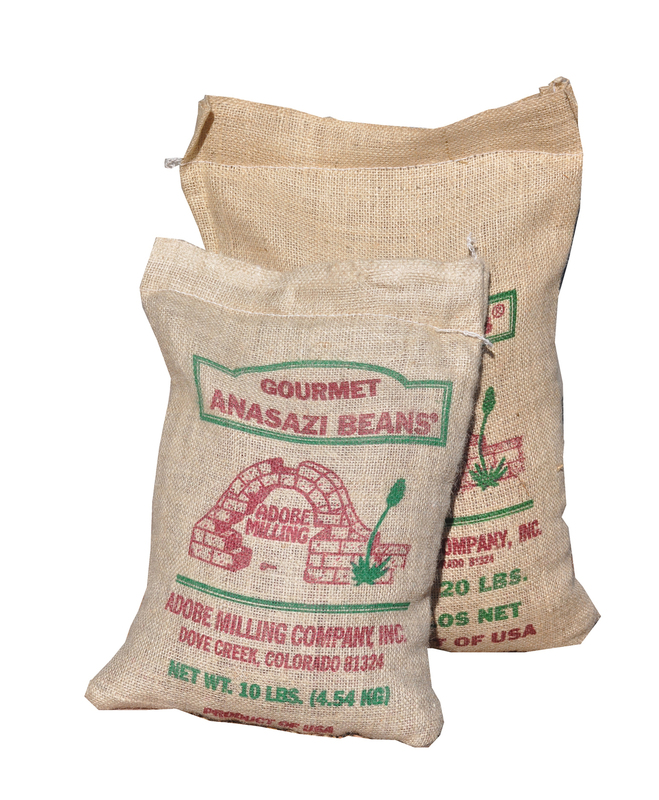 2020-05
2020-05In 2020 We Ate Certain Foods Because We Stopped Buying Fresh Produce and Meat
In late spring 2020, we begin to realize that it was too dangerous and too expensive to buy fresh produce and meat. The fresh produce was often out of stock for weeks at a time. Then other times the produce just seemed difficult to trust. The grocery store often had people without masks and the COVID numbers were rising. We really couldn't trust any fresh fruits or vegetables unless we cooked them. Eventually as the prices began to rise on fresh meats, we stopped buying those too. Eventually we found that the pandemic had completely altered our day to day eating habits. We didn't always trust restaurants for takeout since they had COVID outbreaks also. Living in a small rural town, we had limited options. This left us trying to buy a few canned foods at stores or ordering delivery of shelf-stable foods in bulk from online retailers. One of the things that I remember the most is how I began to struggle with my blood pressure. We were eating too many boxed and canned foods; not enough fruit and vegetables. My sodium intake was high and my potassium was low. We then decided we would start buying dehydrated vegetables and fruit. We tried not to buy canned versions that were preserved with salt. The main thing I remember is that one of the first meals that seemed so good and healthy was a meal of Anazazi beans. We had bought some in New Mexico the year before and really liked them. This time we bought a 10 lb bag and assumed that we may have to stock up as the pandemic continued on. We also bough dehydrated onions, dehydrated jalapenos, and other dehydrated mixed vegetables. We did an instant pot of the beans and what ingredients we had. We really enjoyed it. For the first time in weeks, it felt like a real meal. And this was a hot meal during a warm time of year, something we would normally never cook before 2020. Here is the instant pot recipe and with the ingredients we had, leaving out the ones we didn't have. We adapted as best we could. The original full recipe is linked for comparison. The recipe we found: Instant Pot Anasazi Beans Ingredients 2 cups. dried Anasazi Beans 6 cloves garlic, peeled and smashed 4 c. low sodium chicken stock 1 c. water 1 fresh bay leaf (or 2 dried) 1 t. cumin 1 t. dried oregano 1 t. dehydrated jalapenos 1/8 c. dried onion salt and pepper to taste Instructions: 1. Place dried beans, crushed garlic cloves, chicken stock, water, cumin, oregano, bay leaves, dehydrated jalapenos, and dried onion in instant pot. 2. Close lid and pressure cook at high pressure for 25 minutes, then pressure release for roughly 15 minutes. Open the lid carefully. 3. Switch pot to soup setting. Stir occasionally for about 10 minutes. Taste and season with salt and pepper. 4. Serve. http://eliotseats.com/2019/01/27/instant-pot-anasazi-beans/ -
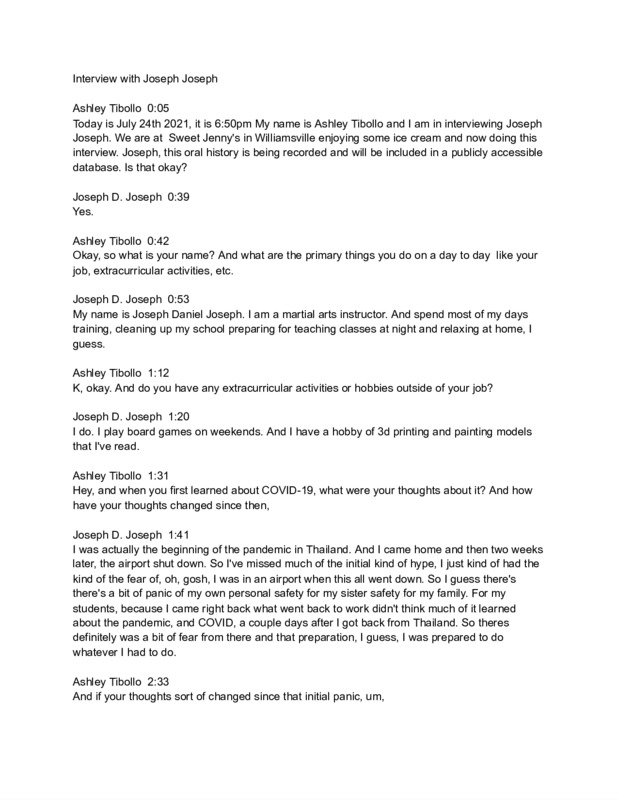 2021-07-24
2021-07-24Joseph D. Joseph, Oral History, July 24, 2021
Ashley Tibollo sits down with Joseph D. Joseph in an ice cream shop in Buffalo, New York to discuss how his life has been affected by the COVID-19 pandemic. In this interview, Joseph describes changes in his day-to-day routine, his life as a martial arts instructor, and changes in his economic status. He also discusses his students and how the pandemic affected them. In the last part of this interview, Joseph discusses his views on politics and what he hopes the future generations will learn about the response to this pandemic. -
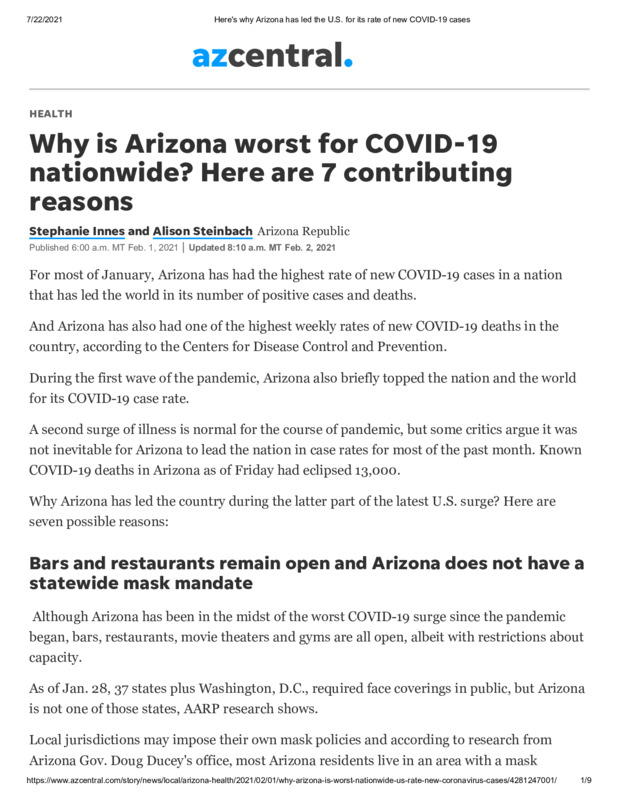 2021-02-01
2021-02-01Why is Arizona worst for COVID-19 nationwide? Here are 7 contributing reasons
This article discusses why Arizona's Covid rate was the highest in the country as of February 1, 2021. Contributing factors included a lack of mask-wearing and cross-border traffic. -
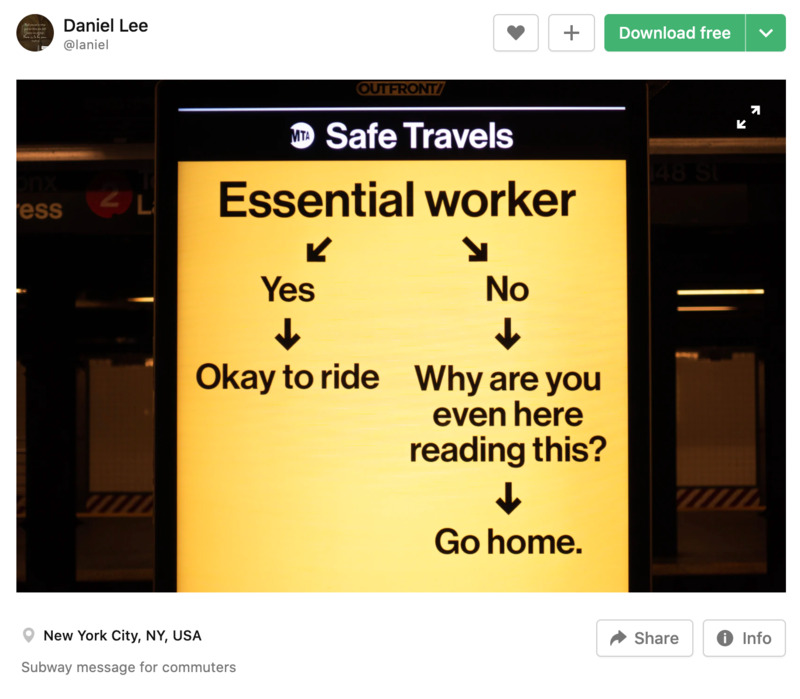 2020
2020Humorous Memes
During quarantine I collected many humorous memes about staying at home and the problems that brought. All sorts of subjects were covered: cooking, getting along with your spouse/roommates, homeschooling the kids, learning to bake bread, being stuck at home, sanitizing, facemasks, people hoarding toilet paper, boredom, effects of isolation, etc. Here are a few of those memes. -
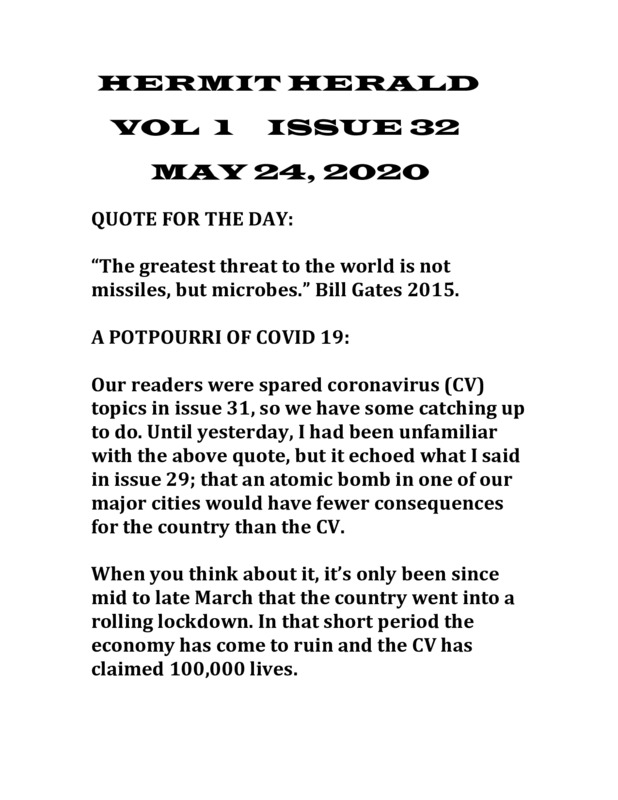 2020-05-24
2020-05-24HERMIT HERALD, ISSUE 32
Global death rate per 100,000 -
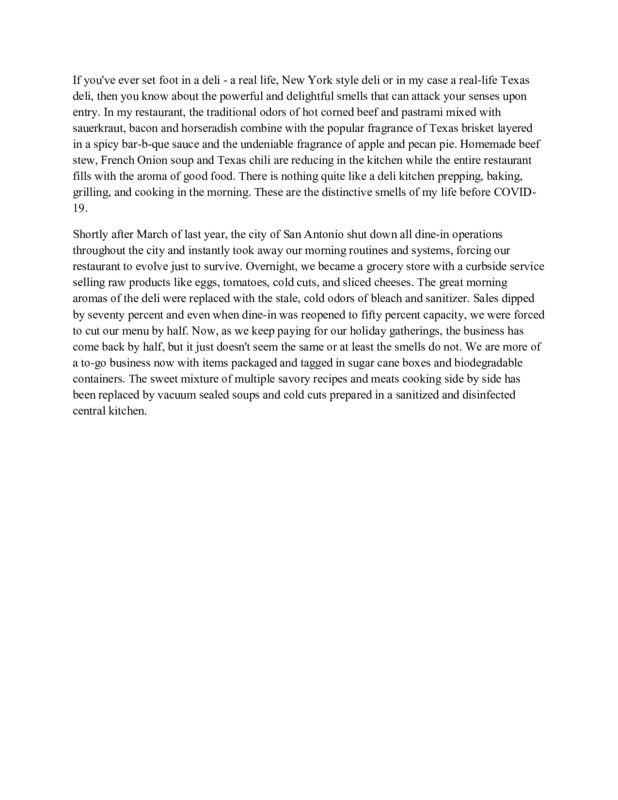 -0021-06-29
-0021-06-29Deli Smells and Sounds
This story tells of the dramatic shift in "normalcy" that the pandemic interrupted. -
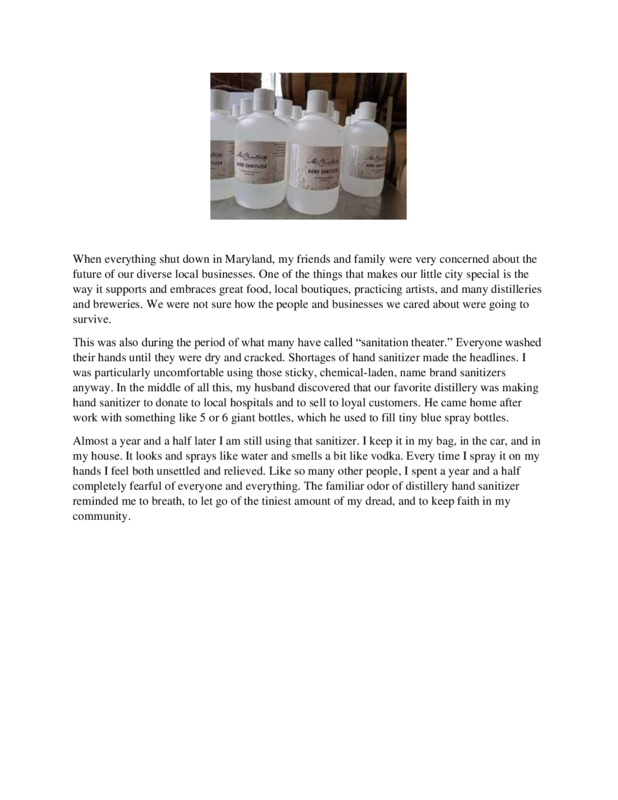 2020-06-14
2020-06-14Solace in the Smell
This is a story about how hand sanitizer kept one woman hopeful during the pandemic. "Sanitation theater" was a coping mechanism used by individuals, businesses, and organizations used to convince ourselves that we were safe. So much of what we needed during the pandemic, was respite from the dread and insecurity. So much was unknown and so much felt out of control. The smell of the hand sanitizer produced by my local distillery instantly evokes the emotions I felt at the height of the pandemic -
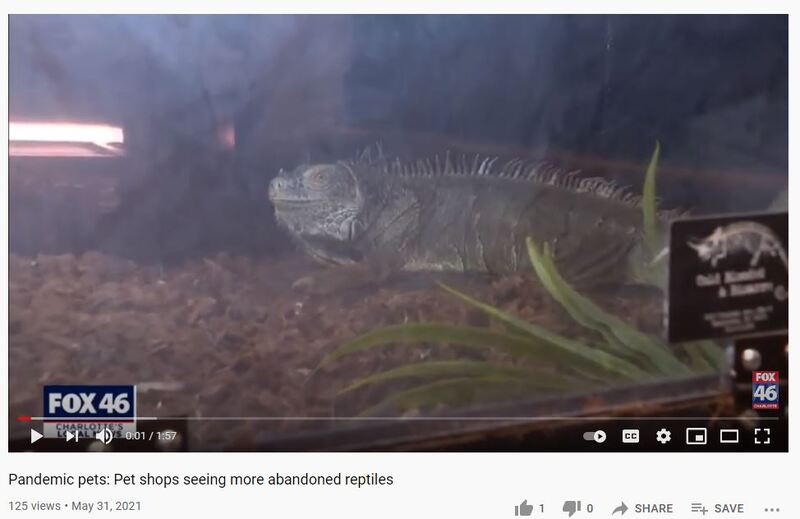 2021-05-31
2021-05-31Pandemic pets: Pet shops seeing more abandoned reptiles
Pet shops in Charlotte, NC report that alongside the increased demand for exotic pets, there has been an uptick in animal abandonment as well. The pet shop in this article reported that the number of rescue calls they received doubled during the pandemic. Exotic animals abandoned outside raise environmental concerns. If some manage to survive the winter, they could pose a threat to native wildlife.
